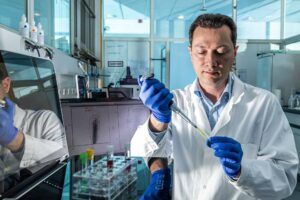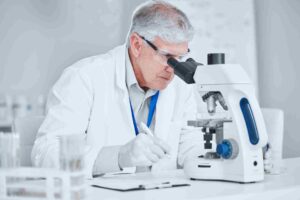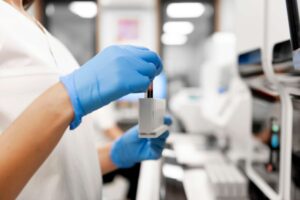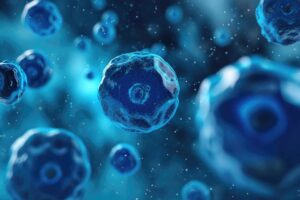What is already known
During pregnancy, a mother’s gut microbiota plays a key role in shaping the offspring’s immune system, metabolism and brain development. Previous research suggests that the microbiota can influence stem cells in the next generation. However, the exact effects on these cells, which are crucial for tissue growth and renewal, are still unclear.
What this research adds
Working in mice, researchers found that the maternal gut microbiota, particularly the bacterium Akkermansia muciniphila, influences offspring development, boosting stem cell functions in the brain and gut. Mice born to mothers that had been exposed to A. muciniphila showed increased production of new neurons, bigger intestinal stem cell populations and better intestinal growth compared to mice born to mothers that had not been exposed to the microbe. The effects were linked to altered maternal metabolites such as short-chain fatty acids, which activated a cellular signaling pathway that regulates key processes, including cell growth and survival.
Conclusions
The findings suggest that a mother’s microbiota has long-term impacts on the offspring’s health and development, representing a promising target for interventions.
During pregnancy, a mother’s gut microbes play a key role in shaping the offspring’s immune system, metabolism and brain development. Now, a study in mice shows that the maternal gut microbiota and its metabolites influence stem cell function in the next generation.
The findings, published in Cell Stem Cell, suggest that a mother’s gut bacteria have long-term impacts on the offspring’s health and development, representing a promising target for interventions.
Disruptions in the microbiota are known to lead to developmental issues, and previous research suggests that a mother’s gut bacteria can influence stem cells in the next generation. However, the exact effects on these cells, which are crucial for tissue growth and renewal, are still unclear.
To evaluate the impact of the microbiota on offspring’s stem cells, researchers led by Haiyue Dang at the Chinese Academy of Sciences in Shanghai exposed mice to Akkermansia muciniphila — a beneficial gut bacterium — throughout pregnancy and after birth.
Influencing growth and behavior
The researchers found that mice born to mothers exposed to Akkermansia muciniphila during pregnancy showed improvements in stem cell activity. Even when these pups were raised by foster mothers, they had increased production of new neurons, bigger intestinal stem cell populations and better intestinal growth compared to mice born to mothers that had not been exposed to the microbe.
Mice born to mothers exposed to A. muciniphila also showed behavioral changes, such as reduced anxiety, the researchers found.
Further analyses showed that maternal exposure to A. muciniphila altered the gut microbiota by increasing specific beneficial bacteria and their metabolites, including short-chain fatty acids and amino acids. These changes in the maternal microbiota were associated with increased stem cell proliferation in the next generation, the researchers found.
Microbiota-based interventions
The team also discovered that transferring gut bacteria from mothers exposed to A. muciniphila to mice raised without microbes led to similar improvements in stem cell functions in the pups.
Further experiments showed that the maternal microbiota influences the offspring’s stem cells by activating a cellular signaling pathway that regulates processes such as cell growth and survival. When pregnant mice were treated with an inhibitor of this pathway, the beneficial effects on stem cell functions were blocked.
“These findings open avenues to support the 21st century medicine in its attempt to develop microbiota-based intervention strategies to promote child health,” the authors say.











